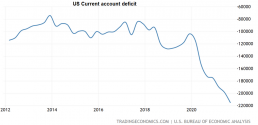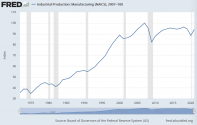They were never equal in per capita GDP, or even close. They were fairly close in total GDP, which is a different metric. A major reason why is that the € was overvalued. It has corrected over the 2010s, which resulted in a stagnant GDP. That is ultimately better in the long run. Now it's arguably undervalued, as the EU has a current account surplus even higher than China (as a percentage of GDP).US and EU used to be almost equal in GDP per capita. 2008 financial crisis did not originate in EU. Yet there was a massive divergence in GDP per capita since 2008 between US and EU. Wonder why.
There were, of course, self-inflicted wounds. Austerity was a failure and set back the continent unnecessarily. I also think lack of deeper fiscal integration ("fiscal union") remains a major issue. I am pessimistic that it will ever happen. German and Dutch taxpayers don't want to share the burden with Italy or Spain. I don't see it changing.


